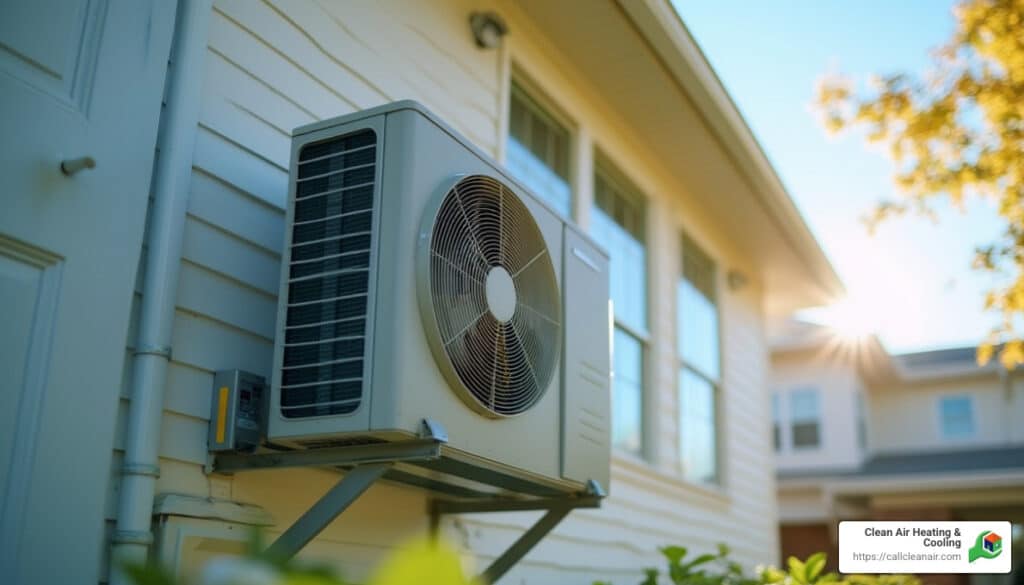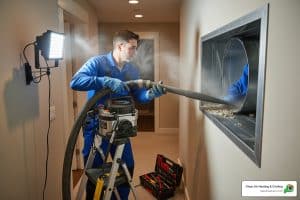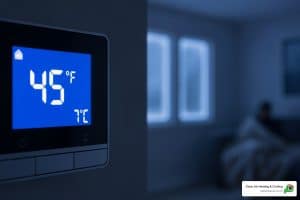Quality air conditioning service is essential for homeowners who value comfort and energy efficiency. Whether you’re looking to keep your home cool during the summer or maintain a comfortable indoor environment year-round, understanding what makes a service “quality” is key. Here’s a quick rundown of what to expect:
- Efficient Cooling: Ensure the system is sized correctly for optimal performance and energy savings.
- Professional Maintenance: Regular check-ups extend the life of your AC and improve its efficiency.
- Prompt Repairs: Quick responses to breakdowns prevent discomfort and further issues.
- Customer Satisfaction: A reliable service focuses on enhancing user experience and meeting specific needs.
In our highly connected world, customer satisfaction goes hand in hand with choosing the right HVAC system. As it turns out, properly maintained air conditioners not only reduce energy bills but also significantly improve comfort.
I’m Colin Matei, with a passion for delivering top-notch Quality air conditioning service across Whatcom, Skagit, and Snohomish Counties. From experience in the HVAC industry, my commitment is to ensure each customer enjoys a seamless, efficient, and comfortable home environment.

Quality air conditioning service terms made easy:
– Air conditioning repair service
– Residential AC maintenance
– Residential AC repair near me
Understanding Quality Air Conditioning Service
When it comes to Quality air conditioning service, understanding the role of system size, age, maintenance, and repair costs is crucial. Let’s break these down:
System Size and Age
The size and age of your air conditioning system can greatly affect its performance and efficiency. A system that’s too small may struggle to cool your home, while one that’s too large can lead to wasted energy and increased costs. It’s important to have a professional assess your home to ensure the system is properly sized. Older systems often lack the efficiency of newer models, leading to higher energy bills and more frequent repairs.
Importance of Regular Maintenance
Regular maintenance is key to extending the life of your air conditioning system. It involves routine check-ups and cleaning, which help keep the system running efficiently.

This not only improves the unit’s performance but also prevents unexpected breakdowns, saving you money in the long run.
Key maintenance tasks include:
- Cleaning or replacing air filters: This ensures optimal airflow and efficiency.
- Checking refrigerant levels: Proper levels are crucial for effective cooling.
- Inspecting electrical components: Ensures all parts are functioning correctly and safely.
Understanding Repair Costs
Repair costs can vary based on system size, age, and the complexity of the issue. Larger systems or those with multiple parts may incur higher costs due to the complexity of repairs. However, investing in professional repairs is often more cost-effective than frequent DIY fixes.

By understanding these aspects of Quality air conditioning service, homeowners can make informed decisions that improve their comfort and reduce long-term expenses. Transitioning into the next section, we’ll explore the benefits of high-efficiency air conditioning systems and how they contribute to energy savings and cost-effectiveness.
Benefits of High-Efficiency Air Conditioning Systems
High-efficiency air conditioning systems are game-changers when it comes to comfort and savings. Here’s why they stand out:
SEER Rating: A Key Indicator
SEER (Seasonal Energy Efficiency Ratio) is a critical measure of an air conditioning system’s efficiency. It tells you how much cooling you get for each unit of energy it uses. Systems with a higher SEER rating are more efficient, meaning they provide more cooling with less energy. This is especially beneficial in areas with variable climates, as it ensures comfort during hot summers without skyrocketing energy bills.
Energy Savings
Choosing a high-efficiency air conditioning system can lead to significant energy savings. These systems are designed to use less electricity, which means lower monthly utility bills. Over time, the savings can be substantial, making the initial investment worthwhile. Plus, using less energy is better for the environment, reducing your carbon footprint.
Cost-Effectiveness
While high-efficiency systems may have a higher upfront cost, they often prove to be more cost-effective in the long run. The combination of lower energy bills and fewer repairs (thanks to advanced technology and better components) adds up to significant savings over the system’s lifespan. Moreover, many utility companies offer rebates or incentives for installing energy-efficient systems, further offsetting the initial costs.
In summary, investing in a high-efficiency air conditioning system is not just about staying cool. It’s about making a smart financial decision that pays off over time. Next, we’ll dive into how to choose the right air conditioning system for your home, considering options like ductless units and central air.
Choosing the Right Air Conditioning System for Your Home
Selecting the right air conditioning system is crucial for your comfort and budget. Let’s explore two popular options: ductless units and central air systems.
Ductless Units
Ductless units, also known as mini-splits, are a versatile choice for many homes. They don’t require ductwork, which makes them perfect for older homes or spaces without existing ducts. These systems offer several advantages:
- Zone Control: You can cool specific areas of your home, allowing for personalized comfort and energy savings.
- Energy Efficiency: Mini-splits are often more energy-efficient than traditional systems because they avoid the air loss associated with ductwork.
- Quick Installation: Without the need for ducts, installation is usually faster and less invasive.
However, keep in mind that the initial cost can vary depending on the number of zones you want to cool.
Central Air
Central air systems are the traditional choice for whole-home cooling. They use a network of ducts to distribute cool air throughout your house. Here are some key points to consider:
- Whole-Home Cooling: Central air systems efficiently cool your entire home, providing consistent temperatures in every room.
- Less Visible: With vents that blend into your walls or floors, central air systems are less obtrusive than wall-mounted mini-splits.
- Initial Costs: While installation can be more complex and costly, the system itself is often less expensive than multiple ductless units.
Installation Costs
When deciding between ductless and central air systems, consider the installation costs. Ductless systems can be more cost-effective if you only need to cool a few rooms. On the other hand, if your home already has ductwork, central air might be the more economical choice.
The right system depends on your specific needs and home layout. Consulting with an HVAC professional can help you make the best decision for your situation.
Now that you understand the options, let’s address some common questions about quality air conditioning service in the next section.
Frequently Asked Questions about Quality Air Conditioning Service
Why does AC repair cost so much?
The cost of AC repair can surprise many homeowners. But when you break it down, it makes sense.
First, consider the system size and age. Larger systems have more components, which means more potential parts that can fail. Older units often require more frequent repairs due to wear and tear.
Another factor is the complexity of the system. Modern AC units are made up of multiple parts that must work together seamlessly. When one part fails, it can affect the entire system, leading to more extensive repairs.
Should you use AC if air quality is bad?
When air quality is poor, such as during a wildfire or high pollution day, using your AC can help. Keep your windows closed and set your AC to recirculate air. This prevents outside air from entering your home while still keeping you cool.
Some systems even have filters that help with smoke prevention, capturing harmful particles before they enter your living space. Always ensure your filters are clean and properly maintained for the best results.
Is high-efficiency AC worth it?
Investing in a high-efficiency AC can lead to significant energy savings. These systems often come with a higher SEER rating (Seasonal Energy Efficiency Ratio), which means they use less energy to cool your home.
While the upfront cost may be higher, the long-term savings on your energy bills can make it a smart investment. Plus, high-efficiency units are often better for the environment, reducing your carbon footprint.
By understanding these aspects of quality air conditioning service, you can make informed decisions that benefit both your comfort and your wallet.
Conclusion
At Clean Air Heating & Cooling, we believe that customer satisfaction is the cornerstone of our business. We know that when your air conditioning system isn’t performing at its best, it can disrupt your comfort and peace of mind. That’s why we prioritize prompt service to get your system back up and running quickly and efficiently.
Our team is dedicated to providing quality air conditioning service that meets your needs and exceeds your expectations. With our 25% utility savings guarantee, we aim to deliver not just comfort but also value. Our commitment to excellence is reflected in the over 480 5-star Google reviews from satisfied customers who trust us with their HVAC needs.
Whether you need a new installation, routine maintenance, or an emergency repair, we are here to help. Our expertise in heating, cooling, and air quality ensures that we can address any issue you face, with a focus on delivering results that last.
To experience the difference with Clean Air Heating & Cooling, visit our service page for more information or to schedule a consultation. We look forward to serving you and ensuring your home remains a haven of comfort all year round.





